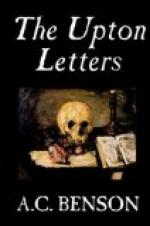T. B.
Upton,
June 18, 1904.
Dear Herbert,—I am sick at heart. I received one of those letters this morning which are the despair of most schoolmasters. I have in my house a boy aged seventeen, who is absolutely alone in the world. He has neither father or mother, brother or sister. He spends his holidays with an aunt, a clever and charming person, but a sad invalid (by the way, in passing, what a wretched thing in English it is that there is no female of the word “man”; “woman” means something quite different, and always sounds slightly disrespectful; “lady” is impossible, except in certain antique phrases). The boy is frail, intellectual, ungenial. He is quite incapable of playing games decently, having neither strength or aptitude; he finds it hard to make friends, and the consequence is that, like all clever people who don’t meet with any success, he takes refuge in a kind of contemptuous cynicism. His aunt is devoted to him and to his best interests, but she is too much of an invalid to be able to look after him; the result is that he is allowed practically to do exactly as he likes in the holidays; he hates school cordially, and I don’t wonder. He fortunately has one taste, and that is for science, and it is more than a taste, it is a real passion. He does not merely dabble about with chemicals, or play tricks with electricity; but he reads dry, hard, abstruse science, and writes elaborate monographs, which I read with more admiration than comprehension. This is almost his only hold on ordinary life, and I encourage it with all my might; I ask about his work, make such suggestions as I can, and praise his successful experiments and his treatises, so far as I can understand them, loudly and liberally.




